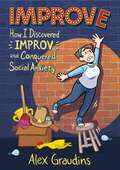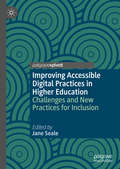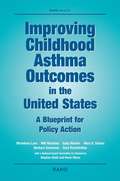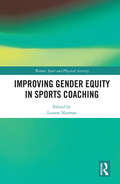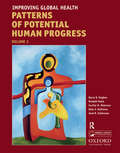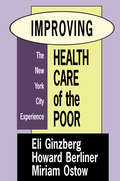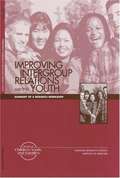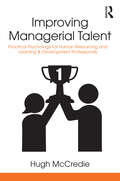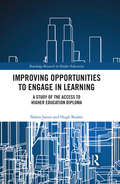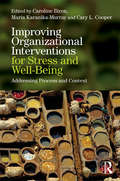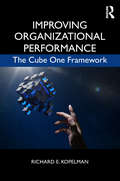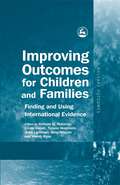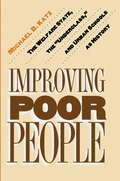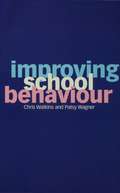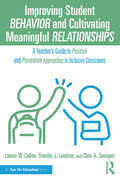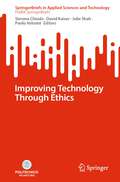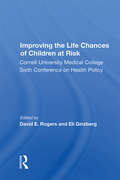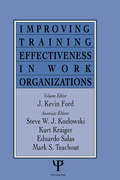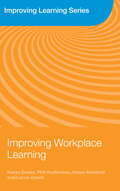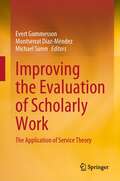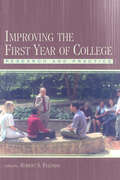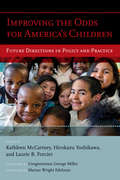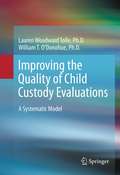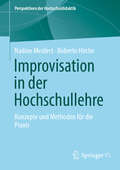- Table View
- List View
Improve: How I Discovered Improv and Conquered Social Anxiety
by Alex GraudinsA graphic memoir for teens about the author's efforts to overcome her social anxiety by learning improv comedy.Alex has crippling social anxiety. All day long, she is trapped in a web of negative thoughts and paralyzing fear. To pull herself free of this endless cycle, Alex does something truly terrifying: she signs up for an improv comedy class. By forcing herself to play silly games and act out ridiculous scenes, Alex confronts the unbearable weight of embarrassment, makes new friends, rediscovers parts of herself that she'd hidden away, and ultimately faces her greatest fear by performing onstage for all to see.
Improving Accessible Digital Practices in Higher Education: Challenges and New Practices for Inclusion
by Jane SealeThis book examines the role played by technologies in removing the disadvantage experienced by students with disabilities in higher education. Addressing five key themes, the editor and contributors explore the practices required of stakeholders within higher education institutions to mediate successful and supportive relationships between disabled learners and their technologies. Ultimately, the book argues that practice in the fields of disability, ICT and higher education is still not providing consistent and widespread positive learning experiences to students with disabilities. In order to address this situation, the field needs to creatively integrate knowledge gained through both research and practice, and to re-imagine what is needed for ICT to meaningfully contribute to a reduction in disadvantage for disabled students. This book will be of interest and value to scholars of disability studies, education and accessibility, and educational technologies.
Improving Childhood Asthma Outcomes in the United States
by Barbara Genovese Sally C. Morton Mary E. Vaiana Marielena Lara Will NicholasOne-liner: A set of policy recommendations to promote the development and maintenance of communities in which children with asthma can be swiftly diagnosed, effectively treated, and protected from exposure to harmful environmental factors. An estimated 5 million U.S. children have asthma. Too many of these children are unnecessarily impaired. Much of the money spent on asthma is for high-cost health care services to treat acute periods of illness. Many asthma attacks could be avoided--and much suffering prevented and many medical costs saved--if more children received good-quality, ongoing asthma care and if the 11 policy recommendations presented in this report were implemented in a oordinated fashion. A national call to action, the policy recommendations span public and private interests and compel integration of public health activities across local, state, and federal levels. This report summarizes the findings of an effort funded by the Robert Wood Johnson Foundation as part of the Pediatric Asthma Initiative, whose purpose is to address current gaps in national childhood asthma care. It is the first national initiative that simultaneously addresses treatment, policy, and financing issues for children with asthma at the patient, provider, and institutional levels. The purpose of RAND's effort was to:--identify a range of policy actions in both the public and private sectors that could improve childhood asthma outcomes nationwide--select a subset of policies to create a blueprint for national policy in this area--outline alternatives to implement these policies that build on prior efforts.The effort developed a comprehensive policy framework that maps the identified strategies to one overall policy objective: to promote the development and maintenance of asthma-friendly communities--communities in which children with asthma are swiftly diagnosed, receive appropriate and ongoing treatment, and are not exposed to environmental factors that exacerbate their condition. This report is intended as a working guide for coordinating the activities of both public and private organizations at the federal, state, and local community levels.
Improving Children's Lives: Alternatives to Current Antipoverty Policy
by Rebecca Y. KimFirst published in 1996. For the last three decades, the public income transfer system for families with children in the United States has been criticized for being overly targeted on extremely poor families headed by single mothers. Most criticism has focused on two features of the system: its categorical nature and its reliance on income-tested benefits. Categorical requirements for eligibility, which limit benefits mainly to single-parent families, have been criticized as unfair to two-parent families and as discouraging marriage. Income-tested benefits have been reprimanded because they discourage work in that they reduce benefits by extremely high rates as earnings increase. To remedy these shortcomings of the over-targeted system, the author discusses three policy proposals, all providing universal benefits: (1) a refundable tax credit for children; (2) universal health care coverage; and (3) a child support assurance system.
Improving Gender Equity in Sports Coaching (Women, Sport and Physical Activity)
by Leanne NormanThe sport coaching profession has historically been and continues to be a White male-dominated occupation and this remains a global issue. This imbalance persists despite an improvement in wider social attitudes and legislation towards equality and diversity within many societies, and despite the action by sporting organisations and national governing bodies. Within the research literature, the underrepresentation of women in sport coaching is a well-documented issue with a number of research studies highlighting the experiences and impact of being in the minority for women coaches. The issue of gender inequity in sport coaching is a long-standing one and shows little sign of changing significantly anytime soon. Therefore, a new approach is needed, one that draws on the knowledge and evidence we have to create actionable, sustainable, deep-rooting interventions that challenge the issue of gender equity at its very core. The overall purpose of Improving Gender Equity in Sports Coaching is to take an action or forward-thinking approach about what works, or could work, to improve the recruitment, development, or promotion of women sport coaches. The book brings together a global group of esteemed scholars working in this subject area. In this book, we have brought together not just the insight but also a collection of strategies and recommendations as to how this research could be or has been utilised to make our sport coaching envrionment places where all coaches feel as though they belong. As such, this ground-breaking book is a must read not just for students and researchers of gender equity in sport but also for policy and decision-makers working in sport.
Improving Global Health
by Barry B. Hughes Jose Roberto Solorzano Randall Kuhn Cecilia Mosca Peterson Dale S. RothmanImproving Global Health is the third in a series of volumes-Patterns of Potential Human Progress-that uses the International Futures (IFs) simulation model to explore prospects for human development: how development appears to be unfolding globally and locally, how we would like it to evolve, and how better to assure that we move it in desired directions. Earlier volumes addressed the reduction of global poverty and the advance of global education. Volume 3 sets out to tell a story of possible futures for the health of peoples across the world. Questions the volume addresses include: -What health outcomes might we expect given current patterns of human development? -What opportunities exist for intervention and the achievement of alternate health futures? -How might improved health futures affect broader economic, social, and political prospects of countries, regions, and the world?
Improving Health Care of the Poor: The New York City Experience
by Miriam OstowFirst Published in 2018. Routledge is an imprint of Taylor & Francis, an Informa company.
Improving Intergroup Relations Among Youth: Summary Of A Research Workshop
by Forum On AdolescenceA report on Improving Intergroup Relations Among Youth
Improving Managerial Talent: Practical Psychology for Human Resourcing and Learning & Development Professionals
by Hugh McCredieAimed at senior HRM and L&D specialists responsible for improving their organisation’s managerial talent, Improving Managerial Talent covers the core findings of the author’s and other published research. It provides a highly participative overview of personality and ability psychometrics, involving the opportunity for self-application. It reveals hard evidence of the extent to which such tests can add value to the prediction of managerial success and their link to requisite competencies. It shows how qualified testers, HR and line managers can each make a unique contribution to the selection process. The book goes on to show how management style is a product of personality and habit and how the acquisition and use of a complementary style can improve persuasiveness and the cultivation of interpersonal skill both for the manager and for those whom the manager might need to coach. It regards job-challenge as the primary engine of managerial growth, both for development in key result areas and for underlying personal competencies. The book provides the reader with some self-insights and an appreciation of validated, powerful, often in-house, methods for selecting and developing better managers. The methods on offer have been validated on a population of over 400 directors of small to medium-sized business units. They include a generic psychometric algorithm for the selection of managers, some unique findings on styles of managing, coaching and persuading based upon close observation of over 200 senior managers and a distinctive and powerful approach to developing interpersonal skills by (1) practice, (2) demonstration of alternatives and (3) reflection.
Improving Opportunities to Engage in Learning: A Study of the Access to Higher Education Diploma (Routledge Research in Higher Education)
by Hugh Busher Nalita JamesImproving Opportunities to Engage in Learning investigates the experiences of mature adult learners returning to formal education. The book challenges the policy discourses in which Access to Higher Education survives by suggesting that continuing education is more about determination by students to alter their identities and career opportunities than meeting narrow performative criteria of financial targets. Chapters explore students’ struggles with institutional and social structures in the current political and socio-economic climate, before identifying how the transformation of their learner identities is facilitated in the courses by collaborative cultures and supportive tutors. The book addresses a research gap in knowledge about students’ and tutors’ experiences of Access to Higher Education courses, presenting a broad perspective on the importance and difficulties of such courses through listening to the voices of students and tutors undertaking a variety of Access to HE pathways. The authors argue that despite success on their courses benefiting the national economy as well as students individually, the social and financial costs of continuing education is almost entirely shifted onto students’ shoulders by policymakers. Despite the costs, students can still see Access to HE as a chance to improve their lives, reflecting the neoliberal discourse of personal responsibility and risk embedded in broader national social and policy discourses. Improving Opportunities to Engage in Learning will be of great interest to researchers, academics and postgraduate students in the fields of further and higher education, widening participation, social justice and sociology of education, and education policy and politics.
Improving Organizational Interventions For Stress and Well-Being: Addressing Process and Context
by Cary L. Cooper Maria Karanika-Murray Caroline BironThis book brings together a number of experts in the field of organizational interventions for stress and well-being, and discusses the importance of process and context issues to the success or failure of such interventions. The book explores how context and process can be incorporated into program evaluation, providing examples of how this can be done, and offers insights that aim to improve working life. Although there is a substantial body of research supporting a causal relationship between working conditions and employee stress and well-being, information on how to develop effective strategies to reduce or eliminate psychosocial risks in the workplace is much more scarce, ambiguous and inconclusive. Indeed, researchers in this field have so far attempted to evaluate the effectiveness of organizational interventions to improve workers’ health and well-being, but little attention has been paid to the strategies and processes likely to enhance or undermine interventions. The focus of this volume will help to overcome this qualitative-quantitative divide. This book discusses conceptual developments, practical applications, and methodological issues in the field. As such it is suitable for students, practitioners and researchers in the fields of organizational psychology and clinical psychology, as well as human resources management, health & safety, medicine, occupational health, risk management and public health.
Improving Organizational Performance: The Cube One Framework
by Richard E. KopelmanThis book presents the Cube One framework, which provides a basis for understanding, diagnosing, and improving organizational performance. It is based on the premise that successful organizations enact practices that satisfy three key constituents: the enterprise itself, customers, and employees. This book offers a uniquely empirical approach by examining enterprise-, customer-, and employee-directed practices. Validity evidence is provided by survey research, studies of financial metrics, and the analysis of cases involving well-known organizations (such as Google, Four Seasons, and Mayo Clinic). The Cube One framework is equally applicable to organizations in the for-profit, nonprofit, and government sectors. After reading this book, students and scholars, as well as organizational practitioners in the fields of organizational behavior and management, will find a practical approach to improving organizational performance.
Improving Outcomes for Children and Families
by Edited by Anthony N. Maluccio Cinzia Canali Tiziano Vecchiato Anita Lightburn Jane Aldgate Wendy RoseSignificant amounts of money and resources are spent on child and family services, so successful evaluation of whether or not they are achieving the best outcomes is therefore essential. This edited collection offers an international perspective on the challenges of designing and undertaking outcome-based evaluation of child and family services. With contributions from leading international experts, it introduces the key ideas and issues currently being debated in the evaluation of these services; discusses relevant approaches to designing and using evaluation methods; and provides examples of evaluation from the real world of policy and practice. Issues covered include setting appropriate indicators for service effectiveness, cross-cultural evaluation of service interventions, service user involvement in evaluation, and evaluations of family and community-based services. This invaluable book will be essential reading for policy makers, planners, commissioners and managers across child and family welfare services, as well as researchers and other academics in the field.
Improving Poor People: The Welfare State, the "Underclass," and Urban Schools as History
by Michael B. Katz"There are places where history feels irrelevant, and America's inner cities are among them," acknowledges Michael Katz, in expressing the tensions between activism and scholarship. But this major historian of urban poverty realizes that the pain in these cities has its origins in the American past. To understand contemporary poverty, he looks particularly at an old attitude: because many nineteenth-century reformers traced extreme poverty to drink, laziness, and other forms of bad behavior, they tried to use public policy and philanthropy to improve the character of poor people, rather than to attack the structural causes of their misery. Showing how this misdiagnosis has afflicted today's welfare and educational systems, Katz draws on his own experiences to introduce each of four topics--the welfare state, the "underclass" debate, urban school reform, and the strategies of survival used by the urban poor. Uniquely informed by his personal involvement, each chapter also illustrates the interpretive power of history by focusing on a strand of social policy in the nineteenth and twentieth centuries: social welfare from the poorhouse era through the New Deal, ideas about urban poverty from the undeserving poor to the "underclass," and the emergence of public education through the radical school reform movement now at work in Chicago. Why have American governments proved unable to redesign a welfare system that will satisfy anyone? Why has public policy proved unable to eradicate poverty and prevent the deterioration of major cities? What strategies have helped poor people survive the poverty endemic to urban history? How did urban schools become unresponsive bureaucracies that fail to educate most of their students? Are there fresh, constructive ways to think about welfare, poverty, and public education? Throughout the book Katz shows how interpretations of the past, grounded in analytic history, can free us of comforting myths and help us to reframe discussions of these great public issues.
Improving School Behaviour
by Chris Watkins Patsy Wagner`Certainly worth reading in order to be reminded of some positive reasons for entering the teaching profession: to value the process of education as much as the content, to view children holistically and to consider schools as places of learning for all' - British Journal of Special Education Behaviour difficulties in our schools will not go away, but they can be significantly reduced. This book makes available to practitioners and students the frameworks and ideas which will help them minimize behaviour difficulty in school. The authors address three important levels: the school, the classroom and the individual. At each level, they show how to identify and analyze patterns of difficulty, and then identify methods for improvement. Improving School Behaviour has been written in order to bring to readers useful approaches founded in a comprehensive range of useful international research, and in years of experience in working with schools. It is a mine of helpful ideas and practical approaches. This is not recipe book, or a source of quick fixes or favourite theories. The authors: #65533; challenge simplified rhetoric about school behaviour #65533; help practitioners identify real areas and effective methods for improvement. #65533; identify the shortcomings of much conventional wisdom about improving behaviour, #65533; show how to implement practical, evidence-based alternatives which can lead to improved results. Improving School Behaviour is an essential resource for all those who are not afraid to improve. It is suitable for use in settings for all age-ranges.
Improving Student Behavior and Cultivating Meaningful Relationships: A Teacher’s Guide to Positive and Preventive Approaches in Inclusive Classrooms
by Timothy J. Landrum Lauren W. Collins Chris A. SweigartThis comprehensive guide offers simple and effective strategies for supporting and improving the classroom behavior of all your students, including those with intensive behavior support needs. Applicable across all K-12 contexts, with recommendations for whole classes as well as individual supports, each practical strategy builds on a foundation of research-supported behavioral approaches. The authors emphasize how each strategy can help build and maintain positive relationships between students and educators, which has been shown to be a key predictor of individual student success. With a myriad of helpful visuals, ready-to-use planning templates, and easy-to-try ideas, this book is key reading for all general or special education teachers, school support staff, and instructional coaches.
Improving Technology Through Ethics (SpringerBriefs in Applied Sciences and Technology)
by David Kaiser Julie Shah Simona Chiodo Paolo VolontéThis book deals with the ethics of technology and addresses specific ethical problems related to some emerging technologies, mainly in the field of computer science (from machine learning models to extracting value from data to human–robot interaction). The contributions are authored mainly by scholars in ICT and other engineering fields who reflect on ethical and societal issues emerging from their own research activity. Thus, rather uniquely, the work overcomes the traditional divide between pure ethical theory that disregards what practitioners do and mere R&D practice that ignores what theorists conceptualize. Conversely, the reader is enabled to understand what ethics means when it is actually put into work by engineering researchers. The book arises from a joint program between MIT and Politecnico di Milano aimed at training early career researchers in addressing the ethical issues of technology and critically reflecting on the social impacts of the emerging, and even disruptive, technologies they are currently developing through their novel research. Overall, it aims at spreading the task of developing technologies that, from the beginning, are designed to be responsible for human life, society, and nature.
Improving The Life Chances Of Children At Risk
by Eli Ginzberg David E. RogersThis book discusses how to identify those children who are at hazard of becoming less than they might be as adults. It explores critical policy issues in broadening access to health care services and reassessing results of major intervention efforts for improving life chances of vulnerable children.
Improving Training Effectiveness in Work Organizations (Applied Psychology Series)
by J. Kevin Ford Eduardo Salas Kurt Kraiger Steve W. J. Kozlowski Mark S. TeachoutThis compelling volume presents the work of innovative researchers dealing with current issues in training and training effectiveness in work organizations. Each chapter provides an integrative summary of a research area with the goal of developing a specific research agenda that will not only stimulate thinking in the training field but also direct future research. By concentrating on new ideas and critical methodological and measurement issues rather than summarizing existing literature, the volume offers definitive suggestions for advancing the effectiveness of the training field. Its chapters focus on emerging issues in training that have important implications for improving both training design and efficacy. They discuss various levels of analysis-- intra-individual, inter-individual, team, and organizational issues--and the factors relevant to achieving a better understanding of training effectiveness from these different perspectives. This type of coverage provides a theoretically driven scientist/practitioner orientation to the book.
Improving Workplace Learning (Improving Learning)
by Karen Evans Lorna Unwin Phil Hodkinson Helen RainbirdAcross the western world, there is a growing awareness of the importance of workplace learning, seen at the level of national and international policy, as well as in the developing practices of employers, training providers and Trades Unions. Authoritative, accessible, and appealing, it presents key findings on work-based learning, bringing together conclusions and investigating a variety of workplace contexts to show how such learning can be improved. An extensive practical treatment, brought to life with illustrations from both the public and private sectors, this book has a unique combination of breadth of coverage and depth of understanding. Grounded in rich and detailed empirical studies, this volume challenges conventional thinking. An important new addition to the Improving Learning series, it focuses on guidelines for improving learning by marrying the very best theory and practice to provide an accessible and authoritative guide to workplace learning. Practitioners, policy makers, students and academics with an interest in learning at work will find this an invaluable addition to their bookshelves.
Improving the Evaluation of Scholarly Work: The Application of Service Theory
by Michael Saren Evert Gummesson Montserrat Díaz-MéndezThis book aims to stimulate debate in the growing and highly controversial area of measuring scholarly work. The authors examine key aspects of this topic through the lens of the latest theoretical developments in service science and associated fields. It includes chapters explaining the theoretical developments and methodological aspects of measuring the quality of academic teaching and research, while other chapters provide a review and analysis of various types of scholarly work metrics and processes with examples from several countries, cultures, and educational systems. The current growing concern about higher education (HE) quality has prompted institutions to divide university teachers’ work into different areas and to design methods aimed at measuring the productivity of these areas. It is widely accepted that the need to evaluate HE service quality is a relevant issue for any society. However, the authors argue that most of the current practices used in the pursuit of this objective are jeopardizing the future of the university as a place of knowledge generation, science evolution and professional education.
Improving the First Year of College: Research and Practice
by Robert S. FeldmanThe first year of college represents an enormous milestone in students' lives. Whether attending a four-year or two-year institution of higher education, living on campus or at home, or enrolled in a highly selective school or a college with an open-admissions policy, students are challenged in unique and demanding ways during their first year.Although many students rise to the challenges they face, for some the demands are too great. Retention rates beyond the first year are disappointing: one third of first-year students seriously consider leaving college during their first term, and ultimately one half of all students who start college complete it.What are the factors that impact students during their first year? How can the academic and social experiences of first-year students be optimized? What can we do to improve retention rates to maximize the number of students who complete college? Improving the First Year of College employs a variety of perspectives from leading researchers and student-service providers to address these questions and examine the first year of college.This volume also highlights the development of learning communities and coaching, as well as how technology impacts students' first year. Perhaps most important, the book provides examples of "best practices," as determined through research by leaders in the field, to permit educators to draw on their experiences.
Improving the Odds for America's Children: Future Directions in Policy and Practice
by Marian Wright EdelmanThis landmark volume commemorates the fortieth anniversary of the Children&’s Defense Fund, which has been an uncompromising champion of American youth for all of those years. Yet the book looks not to the past but at our current circumstances—and at the challenges we must meet now and in the future on behalf of our young people. The book examines critical issues—prenatal and infant health and development, early child care and education, school reform, the achievement gap, vulnerable children, juvenile justice, and child poverty—and highlights crucial practical and policy measures we need to consider and undertake if we are to better serve American children. An invaluable survey of the conditions facing American youth—and a call to action at the local, state, and national levels—Improving the Odds for America&’s Children is an urgent, informative, and inspired volume that addresses shortcomings and challenges we cannot afford to ignore. Contributors include Sara Rosenbaum, Partow Zomorrodian, Jack P. Shonkoff, Joan Lombardi, Deborah Jewell- Sherman, Jal Mehta, Robert B. Schwartz, Jerry D. Weast, Greg J. Duncan, Richard J. Murnane, Michael S. Wald, Jane Waldfogel, Robert G. Schwartz, Laurence Steinberg, Arloc Sherman, Robert Greenstein, Sharon Parrott, and Eric Dearing.
Improving the Quality of Child Custody Evaluations
by William O'Donohue Lauren Woodward TolleThis book resolves a key problem that all evaluators need to attend to:, i.e., what constructs ought to be measured?, all the while giving them practical ways of doing this. It also presents data showing family court judges like the model, and it does this fairly briefly but in a way that is nicely embedded in the research literature.
Improvisation in der Hochschullehre: Konzepte und Methoden für die Praxis (Perspektiven der Hochschuldidaktik)
by Nadine Meidert Roberto HircheDieses Buch gibt eine theoretische und praktische Einführung zur angewandten Improvisation in der Hochschullehre. Eine kurze Geschichte des Improtheaters sowie die Definitionsklärung des Begriffs der angewandten Improvisation bilden die Grundlage, um zu zeigen, wie angewandte Improvisation in der Hochschullehre genutzt werden kann und dass dieser Methodenkasten deutlich mehr ist als eine Sammlung an Icebreakern oder Auflockerungsübungen: Prinzipen und Grundhaltungen des Improtheaters wie Scheiter heiter und Ja, und… können die Basis für experimentierfreudige und kokreative Zusammenarbeit im Lehrraum bieten. Methoden der angewandten Improvisation können mit Lerninhalten kombiniert werden und damit eine aktive Lernerfahrung schaffen. Das Buch wird abgerundet durch eine Methodensammlung und Praxisbeispiele.
